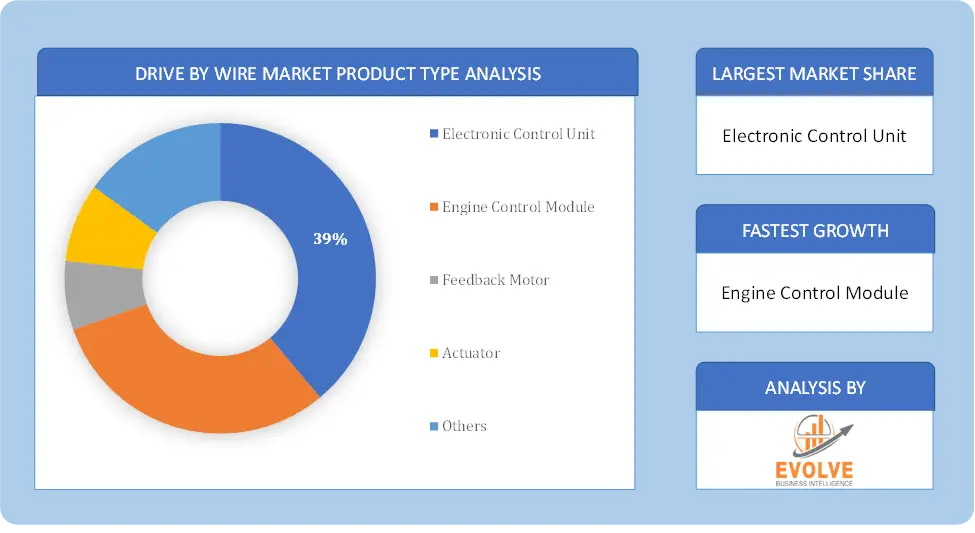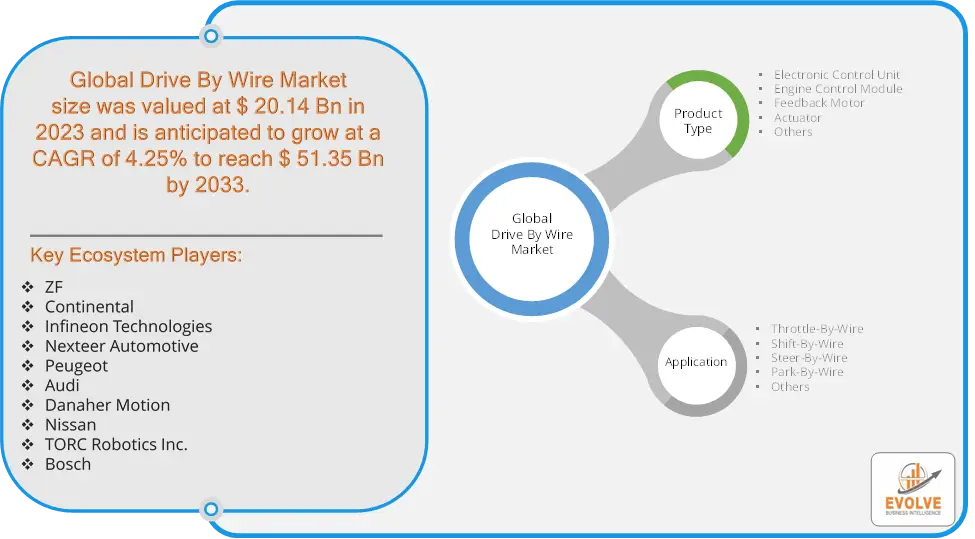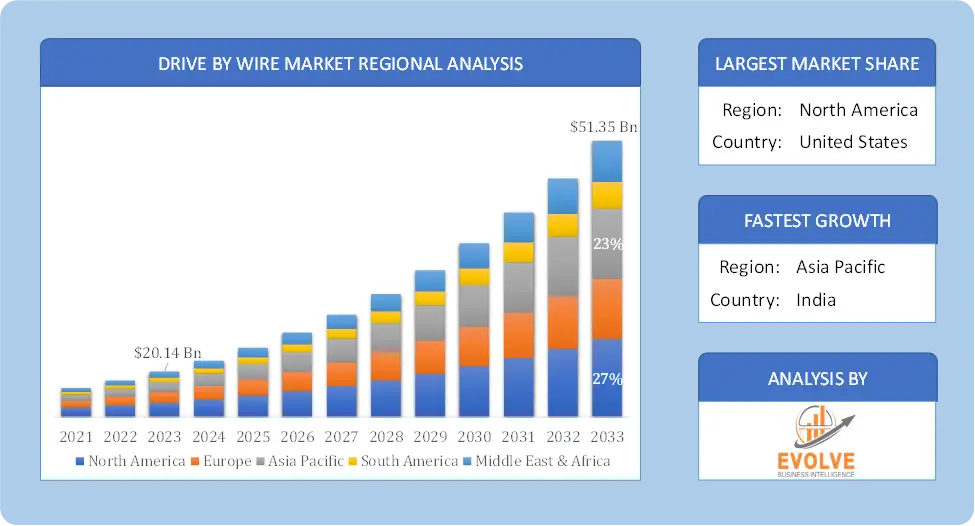Drive By Wire Market Analysis and Global Forecast 2023-2033
$ 1,390.00 – $ 5,520.00Price range: $ 1,390.00 through $ 5,520.00
Drive By Wire Market Research Report: Information By Product Type (Electronic Control Unit, Engine Control Module, Feedback Motor, Actuator, Others), By Application (Throttle-By-Wire, Shift-By-Wire, Steer-By-Wire, Park-By-Wire, Others), and by Region — Forecast till 2033
Page: 175
Drive By Wire Market Overview
The Drive By Wire Market Size is expected to reach USD 51.35 Billion by 2033. The Drive By Wire Market industry size accounted for USD 20.14 Billion in 2023 and is expected to expand at a compound annual growth rate (CAGR) of 4.25% from 2023 to 2033. Drive-by-wire is a technology that replaces traditional mechanical linkages in vehicles with electronic systems. Essentially, it involves using electronic signals to control functions like steering, braking, acceleration, and other vehicle operations. The drive-by-wire market encompasses the development, production, and sale of these electronic systems and components for the automotive industry. It includes various components like sensors, actuators, electronic control units (ECUs), and software.
The market encompasses various stakeholders, including automotive manufacturers, system suppliers, and technology providers, and is influenced by advancements in electronics and automotive technology.
Global Drive By Wire Market Synopsis
The COVID-19 pandemic had a significant impact on the Drive-By-Wire (DBW) Market. The pandemic led to disruptions in the global supply chain, affecting the availability of components and raw materials essential for DBW systems. This caused delays in production and increased costs. With lockdowns and restrictions, many automotive manufacturers experienced a slowdown in production. This reduction in vehicle manufacturing directly impacted the demand for DBW systems. The pandemic accelerated the shift towards more advanced technologies and contactless solutions, including DBW systems, as automakers and consumers increasingly focused on safety, automation, and efficiency. The need for enhanced safety features in vehicles drove the adoption of advanced technologies like DBW systems. The pandemic highlighted the importance of contactless and automated systems, potentially boosting long-term demand. The pandemic heightened awareness of health and safety, leading to greater emphasis on contactless and remote-control technologies, which could drive future adoption of DBW systems.
Drive By Wire Market Dynamics
The major factors that have impacted the growth of Drive By Wire Market are as follows:
Drivers:
Ø Technological Advancements
Innovations in electronics and control systems, including improvements in sensors, actuators, and software, are enhancing the performance and reliability of DBW systems. Increasing consumer demand for advanced features like adaptive cruise control, lane-keeping assist, and autonomous driving technologies is driving the adoption of DBW systems, which enable these functionalities. DBW systems contribute to improved vehicle safety and efficiency by providing precise control, reducing mechanical linkages, and enabling integration with advanced driver-assistance systems (ADAS).
Restraint:
- Perception of High Development Costs and Complexity of Integration
The development and integration of DBW systems involve significant investment in research, development, and testing. The high costs can be a barrier for smaller manufacturers or those with limited budgets. Integrating DBW systems into existing vehicle architectures can be complex. The need for compatibility with other electronic systems and components adds to the challenges and costs. Some consumers may be hesitant to adopt new technologies like DBW systems due to concerns about their reliability, safety, or potential unfamiliarity with electronic control systems.
Opportunity:
⮚ Expansion of Autonomous Vehicles
As the development of autonomous and semi-autonomous vehicles progresses, the demand for DBW systems increases. These systems are essential for implementing the precise control required in autonomous driving technology. The rise of electric vehicles offers substantial opportunities for DBW systems. EVs benefit from the weight reduction and design flexibility provided by electronic control systems, making DBW a valuable component in their design. DBW systems contribute to enhanced vehicle safety through more precise control and integration with safety features. This emphasis on safety can drive demand in both consumer and commercial vehicle segments.
Drive By Wire Market Segment Overview
By Product Type
 Based on Product Type, the market is segmented based on Electronic Control Unit, Engine Control Module, Feedback Motor, Actuator and Others. The Actuator segment dominant the market. Actuators are used in all drive-by-wire applications in some capacity. Four actuators are used in brake-by-wire applications, one for each wheel.
Based on Product Type, the market is segmented based on Electronic Control Unit, Engine Control Module, Feedback Motor, Actuator and Others. The Actuator segment dominant the market. Actuators are used in all drive-by-wire applications in some capacity. Four actuators are used in brake-by-wire applications, one for each wheel.
By Application
Based on Application, the market segment has been divided into the Throttle-By-Wire, Shift-By-Wire, Steer-By-Wire, Park-By-Wire and Others. The Shift-By-Wire segment dominant the market. This is due to the fact that they provide uncomplicated gear shifting with the use of a push button. A vehicle’s fuel economy is maintained with proper gear shifting. It’s a system that uses an electronic control device to adjust the gearbox mode.
Global Drive By Wire Market Regional Analysis
Based on region, the global Drive By Wire Market has been divided into North America, Europe, Asia-Pacific, the Middle East & Africa, and Latin America. North America is projected to dominate the use of the Drive By Wire Market followed by the Asia-Pacific and Europe regions.
 Global Drive By Wire North America Market
Global Drive By Wire North America Market
North America holds a dominant position in the Drive By Wire Market. Due to early adoption of advanced technologies and stringent emission regulations. Countries like the U.S. and Canada are leading in the development and deployment of drive-by-wire systems. High adoption of advanced automotive technologies, strong presence of leading automotive manufacturers, and growing demand for electric and autonomous vehicles and significant investment in research and development, early adoption of new technologies, and favourable regulatory environment supporting innovation and safety features.
Global Drive By Wire Asia-Pacific Market
The Asia-Pacific region has indeed emerged as the fastest-growing market for the Drive By Wire Market industry. Fastest-growing region due to rapid industrialization and increasing demand for automobiles. Countries like China, Japan, and South Korea are major contributors to market growth. Focus on cost-effective solutions and mass production and rising demand for advanced automotive technologies, especially in countries like China, Japan, and South Korea. Growth driven by major automotive manufacturers and increasing consumer preferences for high-tech features.
Competitive Landscape
The global Drive By Wire Market is highly competitive, with numerous players offering a wide range of software solutions. The competitive landscape is characterized by the presence of established companies, as well as emerging startups and niche players. To increase their market position and attract a wide consumer base, the businesses are employing various strategies, such as product launches, and strategic alliances.
Prominent Players:
- ZF
- Continental
- Infineon Technologies
- Nexteer Automotive
- Peugeot
- Audi
- Danaher Motion
- Nissan
- TORC Robotics Inc.
- Bosch
Key Development
In September 2023, A new steer-by-wire system was unveiled by Titan, a UK-based developer and manufacturer of steering systems for electric vehicles. Light commercial vehicles, trucks, and supercars are just a few low-volume vehicles that can utilize the system. Titan offers power steering systems with steer-by-wire, manual, electric (EPAS), and hydraulic options.
In July 2023, The Sprinklr Unified Partners Program was introduced today by Sprinklr (NYSE: CXM), the unified customer experience management (Unified-CXM) platform for contemporary businesses. The upcoming iteration of the Sprinklr partner program incorporates several new partner categories, such as independent consultants, business process outsourcing (BPO) partners, referral partners, and technological solution brokers (TSBs).
Scope of the Report
Global Drive By Wire Market, by Product Type
- Electronic Control Unit
- Engine Control Module
- Feedback Motor
- Actuator
- Others
Global Drive By Wire Market, by Application
- Throttle-By-Wire
- Shift-By-Wire
- Steer-By-Wire
- Park-By-Wire
- Others
Global Drive By Wire Market, by Region
- North America
- US
- Canada
- Mexico
- Europe
- UK
- Germany
- France
- Italy
- Spain
- Benelux
- Nordic
- Rest of Europe
- Asia Pacific
- China
- Japan
- South Korea
- Indonesia
- Austalia
- Malaysia
- India
- Rest of Asia Pacific
- South America
- Brazil
- Argentina
- Rest of South America
- Middle East & Africa
- Saudi Arabia
- UAE
- Egypt
- South Africa
- Rest of Middle East & Africa
| Parameters | Indicators |
|---|---|
| Market Size | 2033: $51.35 Billion |
| CAGR | 4.25% CAGR (2023-2033) |
| Base year | 2022 |
| Forecast Period | 2023-2033 |
| Historical Data | 2021 |
| Report Coverage | Revenue Forecast, Competitive Landscape, Growth Factors, and Trends |
| Key Segmentations | Product Type, Application |
| Geographies Covered | North America, Europe, Asia-Pacific, Latin America, Middle East, Africa |
| Key Vendors | ZF, Continental, Infineon Technologies, Nexteer Automotive, Peugeot, Audi, Danaher Motion, Nissan, TORC Robotics Inc. and Bosch. |
| Key Market Opportunities | • Expansion of Autonomous Vehicles • Improved Safety Features |
| Key Market Drivers | • Technological Advancements • Focus on Vehicle Safety and Efficiency |
REPORT CONTENT BRIEF:
- High-level analysis of the current and future Drive By Wire Market trends and opportunities
- Detailed analysis of current market drivers, restraining factors, and opportunities in the future
- Drive By Wire Market historical market size for the year 2021, and forecast from 2023 to 2033
- Drive By Wire Market share analysis at each product level
- Competitor analysis with detailed insight into its product segment, Government & Defense strength, and strategies adopted.
- Identifies key strategies adopted including product launches and developments, mergers and acquisitions, joint ventures, collaborations, and partnerships as well as funding taken and investment done, among others.
- To identify and understand the various factors involved in the global Drive By Wire Market affected by the pandemic
- To provide a detailed insight into the major companies operating in the market. The profiling will include the Government & Defense health of the company’s past 2-3 years with segmental and regional revenue breakup, product offering, recent developments, SWOT analysis, and key strategies.
Press Release

Global Pharmaceutical Manufacturing Market to Reach $1.38 Trillion by 2035 with 7.35% CAGR, New Research Shows

The Global Mammography Market Is Estimated To Record a CAGR of Around 10.29% During The Forecast Period

Glue Stick Market to Reach USD 2.35 Billion by 2034

Podiatry Service Market to Reach USD 11.88 Billion by 2034

Microfluidics Technology Market to Reach USD 32.58 Billion by 2034

Ferric Chloride Market to Reach USD 10.65 Billion by 2034

Family Practice EMR Software Market to Reach USD 21.52 Billion by 2034

Electric Hairbrush Market to Reach USD 15.95 Billion by 2034

Daily Bamboo Products Market to Reach USD 143.52 Billion by 2034

Cross-border E-commerce Logistics Market to Reach USD 112.65 Billion by 2034
Frequently Asked Questions (FAQ)
What is the study period of this market?
The study period of the global Drive By Wire Market is 2021- 2033
What is the growth rate of the global Drive By Wire Market?
The global Drive By Wire Market is growing at a CAGR of 4.25% over the next 10 years
Which region has the highest growth rate in the market of Drive By Wire Market?
Asia Pacific is expected to register the highest CAGR during 2023-2033
Which region has the largest share of the global Drive By Wire Market?
North America holds the largest share in 2022
Who are the key players in the global Drive By Wire Market?
ZF, Continental, Infineon Technologies, Nexteer Automotive, Peugeot, Audi, Danaher Motion, Nissan, TORC Robotics Inc. and Bosch are the major companies operating in the market
Do you offer Post Sale Support?
Yes, we offer 16 hours of analyst support to solve the queries
Do you sell particular sections of a report?
Yes, we provide regional as well as country-level reports. Other than this we also provide a sectional report. Please get in contact with our sales representatives
Table of Content
Chapter 1. Executive Summary Chapter 2. Scope of The Study 2.1. Market Definition 2.2. Scope of The Study 2.2.1. Objectives of Report Chapter 3. Evolve BI Methodology Chapter 4. Market Insights and Trends 4.1. Supply/ Value Chain Analysis 4.2. Porter’s Five Forces Analysis 4.2.1. Threat of New Entrants 4.2.2. Bargaining Power of Buyers 4.2.3. Bargaining Power of Suppliers 4.2.4. Threat of Substitutes 4.2.5. Industry Rivalry 4.3. Impact of COVID-19 on drive by wire Market 4.3.1. Impact on Market Size 4.3.2. End User Trend, Preferences and Budget Impact 4.3.3. Regulatory Framework/Government Policies 4.3.4. Key Players Strategy to Tackle Negative Impact 4.3.5. Opportunity Window Chapter 5. Market Dynamics 5.1. Introduction 5.2. DRO Analysis 5.2.1. Drivers 5.2.2. Restraints 5.2.3. Opportunities Chapter 6. Global drive by wire Market, By Product Type 6.1. Introduction 6.2. Electronic Control Unit 6.3. Engine Control Module 6.4. Feedback Motor 6.5. Actuator 6.6. Others Chapter 7. Global drive by wire Market, By Application 7.1. Introduction 7.2. Throttle-by-wire 7.3. Shift-by-wire 7.4. Steer-by-wire 7.5. Park-by-wire 7.6. Others Chapter 8. Global drive by wire Market, By Region 8.1. Introduction 8.2. North America 8.2.1. Introduction 8.2.2. Driving Factors, Opportunity Analyzed and Key Trends 8.2.3. Market Size and Forecast, By Country, 2020 - 2028 8.2.4. Market Size and Forecast, By Product Type, 2020 - 2028 8.2.5. Market Size and Forecast, By Application, 2020 – 2026 8.2.6. US 8.2.6.1. Introduction 8.2.6.2. Driving Factors, Opportunity Analyzed and Key Trends 8.2.6.3. Market Size and Forecast, By Product Type, 2020 - 2028 8.2.6.4. Market Size and Forecast, By Application, 2020 - 2028 8.2.7. Canada 8.2.7.1. Introduction 8.2.7.2. Driving Factors, Opportunity Analyzed and Key Trends 8.2.7.3. Market Size and Forecast, By Product Type, 2020 - 2028 8.2.7.4. Market Size and Forecast, By Application, 2020 - 2028 8.3. Europe 8.3.1. Introduction 8.3.2. Driving Factors, Opportunity Analyzed and Key Trends 8.3.3. Market Size and Forecast, By Country, 2020 - 2028 8.3.4. Market Size and Forecast, By Product Type, 2020 - 2028 8.3.5. Market Size and Forecast, By Application, 2020 – 2026 8.3.6. Germany 8.3.6.1. Introduction 8.3.6.2. Driving Factors, Opportunity Analyzed and Key Trends 8.3.6.3. Market Size and Forecast, By Product Type, 2020 - 2028 8.3.6.4. Market Size and Forecast, By Application, 2020 - 2028 8.3.7. France 8.3.7.1. Introduction 8.3.7.2. Driving Factors, Opportunity Analyzed and Key Trends 8.3.7.3. Market Size and Forecast, By Product Type, 2020 - 2028 8.3.7.4. Market Size and Forecast, By Application, 2020 - 2028 8.3.8. UK 8.3.8.1. Introduction 8.3.8.2. Driving Factors, Opportunity Analyzed and Key Trends 8.3.8.3. Market Size and Forecast, By Product Type, 2020 - 2028 8.3.8.4. Market Size and Forecast, By Application, 2020 - 2028 8.3.9. Italy 8.3.9.1. Introduction 8.3.9.2. Driving Factors, Opportunity Analyzed and Key Trends 8.3.9.3. Market Size and Forecast, By Product Type, 2020 - 2028 8.3.9.4. Market Size and Forecast, By Application, 2020 - 2028 8.3.10. Rest of Europe 8.3.10.1. Introduction 8.3.10.2. Driving Factors, Opportunity Analyzed and Key Trends 8.3.10.3. Market Size and Forecast, By Product Type, 2020 - 2028 8.3.10.4. Market Size and Forecast, By Application, 2020 - 2028 8.4. Asia-Pacific 8.4.1. Introduction 8.4.2. Driving Factors, Opportunity Analyzed and Key Trends 8.4.3. Market Size and Forecast, By Country, 2020 - 2028 8.4.4. Market Size and Forecast, By Product Type, 2020 - 2028 8.4.5. Market Size and Forecast, By Application, 2020 - 2028 8.4.6. China 8.4.6.1. Introduction 8.4.6.2. Driving Factors, Opportunity Analyzed and Key Trends 8.4.6.3. Market Size and Forecast, By Product Type, 2020 - 2028 8.4.6.4. Market Size and Forecast, By Application, 2020 - 2028 8.4.7. India 8.4.7.1. Introduction 8.4.7.2. Driving Factors, Opportunity Analyzed and Key Trends 8.4.7.3. Market Size and Forecast, By Product Type, 2020 - 2028 8.4.7.4. Market Size and Forecast, By Application, 2020 - 2028 8.4.8. Japan 8.4.8.1. Introduction 8.4.8.2. Driving Factors, Opportunity Analyzed and Key Trends 8.4.8.3. Market Size and Forecast, By Product Type, 2020 - 2028 8.4.8.4. Market Size and Forecast, By Application, 2020 - 2028 8.4.9. South Korea 8.4.9.1. Introduction 8.4.9.2. Driving Factors, Opportunity Analyzed and Key Trends 8.4.9.3. Market Size and Forecast, By Product Type, 2020 - 2028 8.4.9.4. Market Size and Forecast, By Application, 2020 - 2028 8.4.10. Rest of Asia-Pacific 8.4.10.1. Introduction 8.4.10.2. Driving Factors, Opportunity Analyzed and Key Trends 8.4.10.3. Market Size and Forecast, By Product Type, 2020 - 2028 8.4.10.4. Market Size and Forecast, By Application, 2020 - 2028 8.5. Rest of The World (Row) 8.5.1. Introduction 8.5.2. Driving Factors, Opportunity Analyzed and Key Trends 8.5.3. Market Size and Forecast, By Product Type, 2020 - 2028 8.5.4. Market Size and Forecast, By Application, 2020 - 2028 8.5.5. Market Size and Forecast, By Region, 2020 - 2028 8.5.6. South America 8.5.6.1. Introduction 8.5.6.2. Driving Factors, Opportunity Analyzed and Key Trends 8.5.6.3. Market Size and Forecast, By Product Type, 2020 - 2028 8.5.6.4. Market Size and Forecast, By Application, 2020 - 2028 8.5.7. Middle East and Africa 8.5.7.1. Introduction 8.5.7.2. Driving Factors, Opportunity Analyzed and Key Trends 8.5.7.3. Market Size and Forecast, By Product Type, 2020 - 2028 8.5.7.4. Market Size and Forecast, By Application, 2020 - 2028 Chapter 9. Competitive Landscape 9.1. Introduction 9.2. Vendor Share Analysis, 2020/Key Players Positioning, 2020 Chapter 10. Company Profiles 10.1. ZF 10.1.1. Business Overview 10.1.2. Financial Analysis 10.1.3. Product Portfolio 10.1.4. Recent Development and Strategies Adopted 10.1.5. SWOT Analysis 10.2. Continental 10.2.1. Business Overview 10.2.2. Financial Analysis 10.2.3. Product Portfolio 10.2.4. Recent Development and Strategies Adopted 10.2.5. SWOT Analysis 10.3. Infineon Technologies 10.3.1. Business Overview 10.3.2. Financial Analysis 10.3.3. Product Portfolio 10.3.4. Recent Development and Strategies Adopted 10.3.5. SWOT Analysis 10.4. Nexteer Automotive 10.4.1. Business Overview 10.4.2. Financial Analysis 10.4.3. Product Portfolio 10.4.4. Recent Development and Strategies Adopted 10.4.5. SWOT Analysis 10.5. Peugeot 10.5.1. Business Overview 10.5.2. Financial Analysis 10.5.3. Product Portfolio 10.5.4. Recent Development and Strategies Adopted 10.5.5. SWOT Analysis 10.6. Audi 10.6.1. Business Overview 10.6.2. Financial Analysis 10.6.3. Product Portfolio 10.6.4. Recent Development and Strategies Adopted 10.6.5. SWOT Analysis 10.7. Danaher Motion 10.7.1. Business Overview 10.7.2. Financial Analysis 10.7.3. Product Portfolio 10.7.4. Recent Development and Strategies Adopted 10.7.5. SWOT Analysis 10.8. Nissan 10.8.1. Business Overview 10.8.2. Financial Analysis 10.8.3. Product Portfolio 10.8.4. Recent Development and Strategies Adopted 10.8.5. SWOT Analysis 10.9. TORC Robotics Inc. 10.9.1. Business Overview 10.9.2. Financial Analysis 10.9.3. Product Portfolio 10.9.4. Recent Development and Strategies Adopted 10.9.5. SWOT Analysis 10.10. Bosch 10.10.1. Business Overview 10.10.2. Financial Analysis 10.10.3. Product Portfolio 10.10.4. Recent Development and Strategies Adopted 10.10.5. SWOT Analysis Chapter 11. Key Takeaways
Connect to Analyst
Research Methodology









